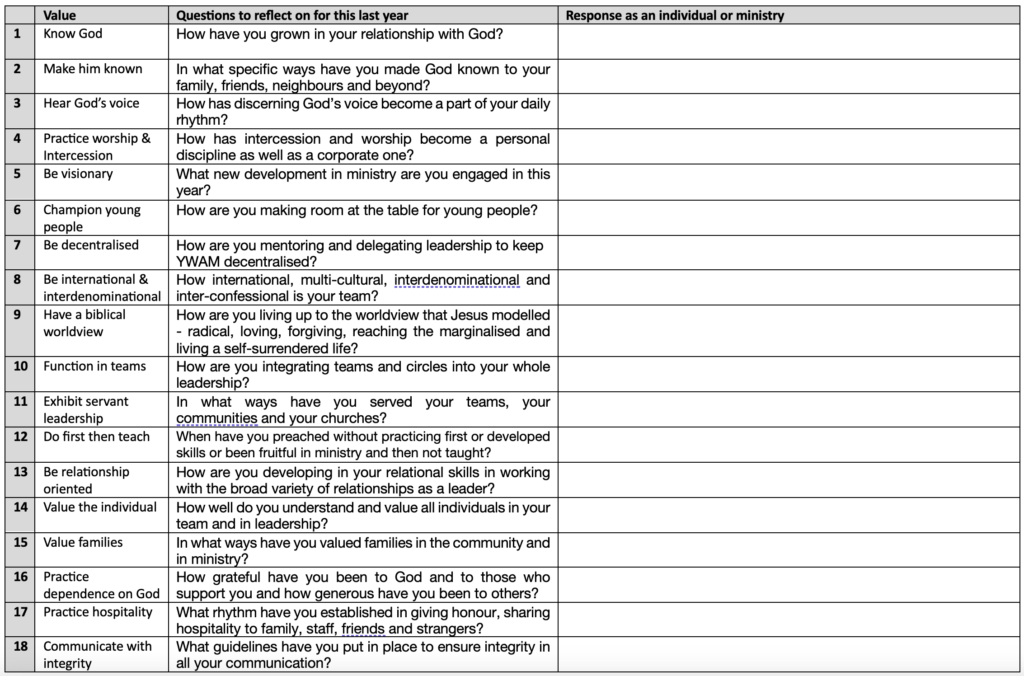
Some years ago, I was asked to help a church planting team with their mission statement and strategy. I love this kind of assignment and so happily met with the team for a couple of days. The vision became clear as we dialogued together, and a plan began to emerge as to how they were going to implement the church plant. Before we finished, I raised the important question of values for the team. They hadn’t thought about values and the general feeling was that, as a team they were doing well and now they had the vision developed on paper, they could go ahead and didn’t need to worry about values. I pushed on them to reconsider but to no avail. Three months later the team broke apart due to differences in approach and how the team should be functioning together. I have never forgotten the lesson – vision and values go together. One without the other can lead to disaster.
We joined staff in YWAM forty-five years ago because of the great year we had experienced attending our DTS (discipleship training school) and SOE (School of Evangelism). We had been recruited through the vision shared but now were staying on staff because of the relationships we had built. We enjoyed the loving community we had joined, and we watched our lives being transformed through the depth of teaching and authentic lifestyles of leaders around us. There was something fresh and alive that drew us in. We enjoyed the culture, the values, the sense of God’s presence and the vision to ‘Go’. I don’t think either of us really knew what was waiting for us, but it was exciting, and we had a sense of adventure. Our motto as YWAM was and still is: ‘To know God and make him known.’
This letter is very specifically geared to YWAM but if you are part of another organisation you can take a look at your own culture and vision statements to see how you are measuring up. Whatever organisation, business, or church you work with, it’s important to understand their vision, purpose, motto, values and any statement they make about who they are and what they want to do. All these statements work together to create the culture of the work.
If you are a YWAMer, have you ever thought about our motto – in terms of what it suggests for our priorities? It suggests the two most important things are knowing God personally and seeking to make him know through completing the great commission. OK let’s come back to this in a few minutes.
YWAM has eighteen foundational values that were formulated over our initial years of development. They came initially as profound messages that we recognised as ‘words from the Lord’ and keys for us to live by. Over time they were word smithed and established as foundations for us to share through our orientation course into the mission – our discipleship training course – and on through our staff experience. These values weren’t just to be taught but to be lived out and experienced through community. These values give us a sense of priority and what we are to focus our time and energy with. Our values speak of the way in which we do things rather than what we do. They are not giving us a direction or vision but they provide the way we behave in moving into the vision and how we live as we implement the vision. Of our eighteen values, I recognised that a third were more geared to knowing God, and another third were focused on making God known.

As I considered the final third of the values, it was obvious to see the focus on relationships, team, and community, as you can see from the chart below. So, it occurred to me that the motto perhaps should read: ‘To know God, to build community and make God known.’
This makes even our motto an evaluative tool. We can measure ourselves around the three phrases.
Evaluation 1: Take a look at yourself as a leader and ask: How am I developing in my relationship with God, in my building community and in making God known? Then look at your ministry or your community/base and ask the same questions.

YWAM is called to three elements of ministry – Evangelism, Training & Mercy ministry. We have a desire to share the story that Jesus told while he was on earth. The message of the preaching the kingdom of God and seeing it go to all the nations, peoples and tongues on earth. This relates to the great commission which we are seeking to complete.
When we first started as national leaders in Scotland, Loren visited us and spoke to our leaders. He asked us to introduce ourselves by sharing our name, our ministry and then to say ‘times ten.’ We went around the circle and humbly obeyed his request. Then he explained. He said, ‘Whatever you are doing that is bearing fruit, multiply it training others to do what you are doing.’ With this lesson in mind, Rite started a preschool in the town and three months later started a training – principles of early childhood education. She was literally only one step ahead but was able to multiply her vision. As we developed a variety of ministries in the city where we were living, we started a ‘school of urban missions.’ One again we were able to send out workers to other cities to multiply what we had started.
Right from our first summer outreach in the Caribbean as Loren started YWAM, they were faced with having to deal with devastation caused by a hurricane and quickly moved into action helping the locals in whatever way they could to meet the practical needs of the families affected. That moved to building ministry among refugees in Thailand in the 70’s and ever since mercy ministry or relief and development has been a major thrust. We now understand that 1 in every 100 people on earth are displaced. There is a huge need everywhere.
Evaluation 2: How are you and your ministry engaged in these three elements of our work?

We say in YWAM that we work locally, nationally/regionally, globally. So if we look at our ministry, how much time, energy and resources go to our local work, national or regional and global ministry. We are all involved in targeting or adopting unreached peoples, we send our outreaches all over the world, we train people generally from a wide geographical area, we may travel to other nations to train, we work with churches throughout our nations and establish ministries right on our doorstep and meet the felt needs. If we are YWAM, we are involved in different capacities in all three areas. For example:

Evaluation 3: What is your vision and ministry locally, nationally/regionally and globally?
What is your capacity for ministry in these three areas and what kind of percentage would you place for each?

Over the years we have had times of refocusing on our values to make sure we understand what they mean and how we are to implement them in our lives as YWAMers. These values are our main way of bringing accountability to one another. If a ministry is moving off on a tangent, then we will ask questions of that ministry regarding the values that aren’t being upheld and give them opportunity of reinstating the particular values that are missing. So, even on a yearly basis we can use the list of values as a measure of how we are doing. I have created a question for each of the values to help us in our evaluation. This can be done as an individual or as a team or a base community.
Evaluation 4: How are you as a leader and as a ministry living up to the eighteen values of YWAM? Below is a chart of our eighteen values as questions to answer as an individual or as a team or ministry.

I hope you and your team enjoy going through these evaluations together,
Until next month
Stephe
